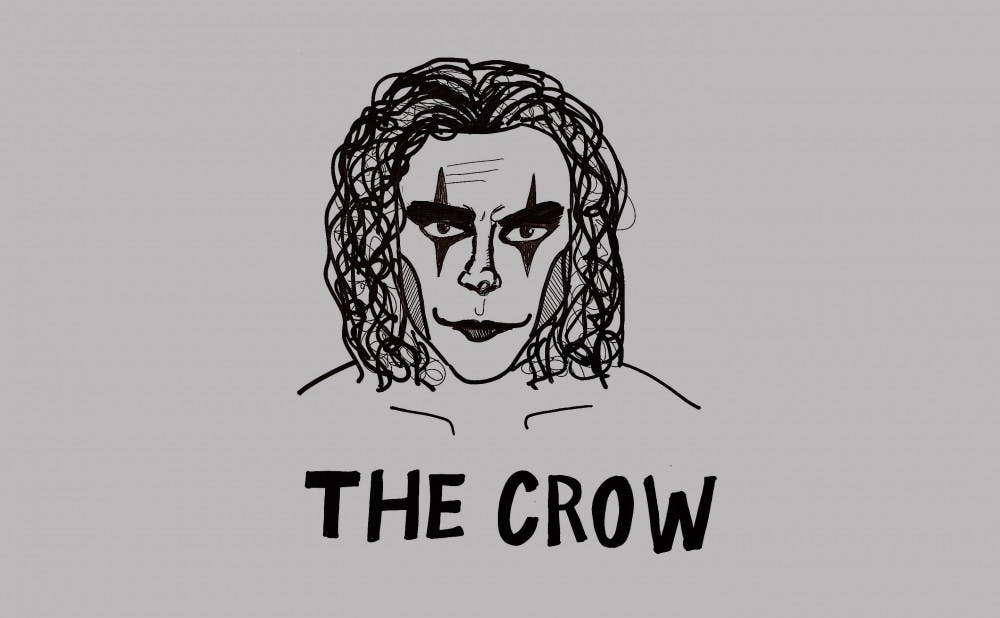There are some films that almost everyone agrees are unsuitable for children. But among these unsuitable films are the gory slasher flicks and creature horror movies I grew up watching. By the age of seven, I had played every dark-jacketed, age-inappropriate VHS tape on the bookcase in my father’s TV room. Though I never expected to stumble upon something that would change my life during my weekend movie marathons, that’s exactly what happened. Sandwiched between Stephen King’s 1990 made-for-television miniseries “It” and Daniel Myrick’s 1999 mock found-footage film “The Blair Witch Project,” another film caught my eye with the bold red gothic lettering on its spine: 1994 cult classic “The Crow.”
More than anything, “The Crow” is a love story. Based on James O’Barr’s 1989 graphic novel, the film follows Shelly Webster (Sofia Shinas) and her “nice, rock ‘n’ roll boyfriend” Eric Draven (Brandon Lee). After signing a petition to fight eviction, Shelly and Eric are brutally murdered by a gang in their dilapidated inner-city apartment on Devil’s Night — the night before their wedding day. One year from the night of their murder, a crow lands on Eric’s grave, summoning him back to the land of the living. When he has at last pieced together what happened to him and Shelly and the future they were robbed of, Draven embraces his newfound immortality, disguises his face with stage makeup and sets out to right a cosmic wrong.
One by one, Eric hunts down his assailants with the help of the Crow — his link between the living world and the realm of the dead. The first to go is knife-fanatic Tin-Tin (Laurence Mason), who admits to killing Shelly without ever recognizing Draven for who he is. Draven then pays a visit to gang-affiliate and pawn shop owner Gideon (Jon Polito), instructing him to “tell the rest of them that death is coming for them tonight.”
With the help of detective and friend Officer Albrecht (Ernie Hudson), Draven hunts down and enacts vengeance upon each of the men who hurt Shelly: Funboy, Skank, T-Bird and, ultimately, leader and orchestrator Top Dollar. Finally, after his gruesome work is done, Draven returns to his grave, where Shelly greets him and welcomes him to a peaceful afterlife.
Though violent and dark, I was never felt disturbed by or scared of “The Crow” like I was after I watched “Hellraiser.” As a young girl, I recognized myself in Draven. I found this film at a time in my life when I was attempting to navigate my own darkness. I not only related to but found comfort in Draven’s character. He became my personal guardian angel — proof that no matter what horror and injustice befell you, someone or something would be there in the end to balance the scales. Lee’s famous line, “It can’t rain all the time,” became my mantra. As I grew older and entered middle school, I clothed myself in Hot Topic’s finest memorabilia, including a headstone-shaped locket that read “True love never dies” on the inside panel opposite a picture of Lee as Draven. Now a treasured keepsake of mine, my locket kept a connection between us in the most physical way.
As an older and more filmically-educated viewer, I can appreciate “The Crow” just as much for its cinematic qualities as I can for its narrative message. The entirety of the film is shot in radically de-saturated tones, as close to black and white as one can get without actually shooting in black and white. The only moments of vivid color are flashbacks in which we see Eric and Shelly before their deaths. The juxtaposition of these scenes of life and resurrected life help us understand the bleakness of Eric’s existence without Shelly.
The film became even more poignant when I learned that Brandon Lee lost his life while shooting the movie. On March 31, 1993 — over 25 years ago — Lee was struck by a bullet from an improperly-disarmed cartridge at close range and died at New Hanover Regional Medical Center in Wilmington, N.C. After contentious debates about whether it was appropriate to release the film given its violent nature, Miramax decided on a theatrical release after dedicating the film to Lee and his fiance, Eliza.
I have never taken it lightly that “The Crow” is Lee’s final work. It makes the film feel even more like a gift — something necessary and significant. And, in a film about love’s endurance in the face of pain and loss, his death takes on new meaning. Brandon Lee and Eric Draven are, in many ways, inseparable from myself. Fans like me take comfort in knowing that, “If the people we love are stolen from us, the way to have them live on is to never stop loving them. Buildings burn, people die, but real love is forever.”
Get The Chronicle straight to your inbox
Sign up for our weekly newsletter. Cancel at any time.

